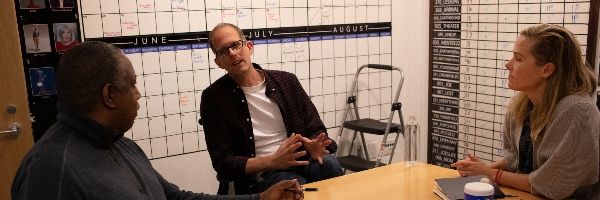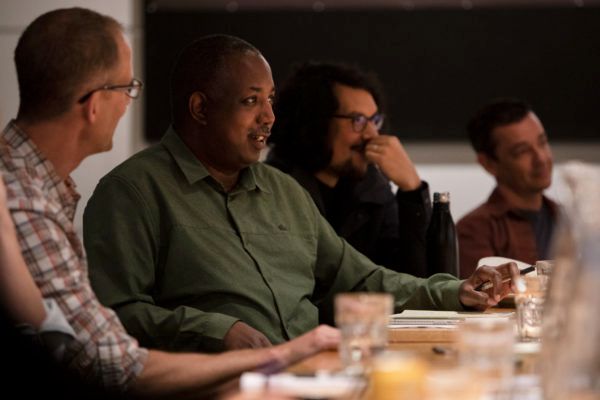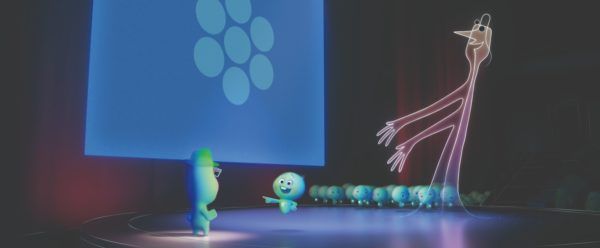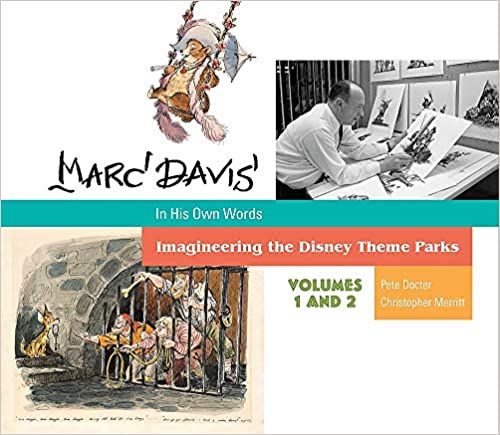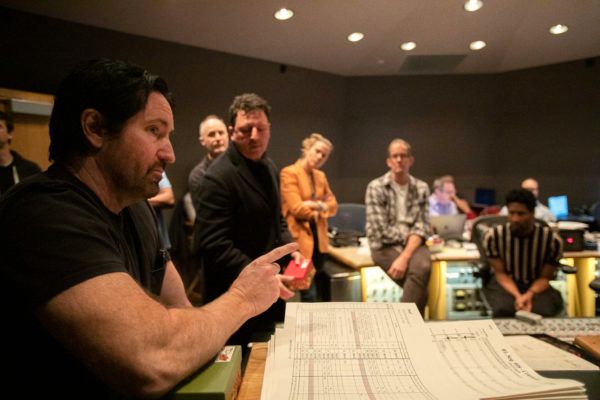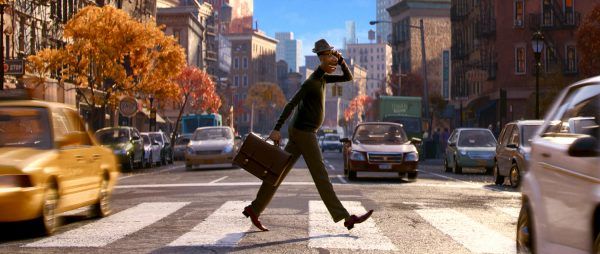Soul (coming to Disney+ on Christmas Day) is the kind of Pixar movie that could have only sprung from the mind of Pete Docter. Docter started at Pixar after graduating college, in 1990 at the age of 21. He went on to contribute to the studio’s pioneering short films and initial features like Toy Story, and made the leap to director with 2001’s Monsters, Inc. (a film that lost the inaugural Best Animated Feature Oscar to, ugh, Shrek). Since then, his projects have always stood out from the crowd – he came up with the initial concept for WALL•E, then known as Trash Planet, before giving it to Andrew Stanton to develop further, co-wrote and directed Up (the first animated film since Beauty and the Beast to be nominated for a Best Picture Oscar) and co-wrote and directed Inside Out. He’s been nominated for 8 Oscars and won 2. His features are defined by truly outside-the-box ideas (geriatric man travels with boy scout to mysterious South American jungle where he’s greeted by a talking dog and primordial bird, you say?) that are only matched by their deep emotionality (goodbye Bing Bong). And Soul is no different.
Soul is the story of Joe Gardner (Jamie Foxx), a middle school music teacher who dreams of something more. On the eve of his big break, playing with one of his favorite jazz bands (led by Angela Bassett), he falls down a manhole and finds his consciousness in a kind of supernatural ether. That’s where he teams up with another troubled soul (literally) named 22 (Tina Fey) and they make an effort to return Joe’s consciousness to his body, and along the way both Joe and 22 understand more deeply what it means to be human.
We were lucky to jump on a Zoom call with Docter, his co-director and co-screenwriter Kemp Powers and producer Dana Murray, to talk about how he turned such a grand conceit into a zippy animated feature, what it was like when Docter assumed the role of Chief Creative Officer of Pixar, and how Trent Reznor and Atticus Ross came to score a Pixar movie, alongside jazz great Jon Baptiste. And, yes, we’re pretty sure Docter was talking to us from inside his treehouse.
Check out the full interview below and click here for our reaction to seeing 40 minutes of footage from the film.
Collider: I thought I would start with a grand question befitting the grand ideas of this movie, which is, can you just talk about the development process? How do you go from, "I want to make a movie about what makes us human," to a 91-minute animated feature coming out next month?
PETE DOCTER: Wow. That's a good question. Dana, answer that one, will you?
DANA MURRAY: Well...
DOCTER: Because I don't know.
MURRAY: It's a lot of talking in a room, and drawing, and bringing in different people, and talking more, and bringing in experts and research. We talked to hundreds of people from religious experts to shamans, to yoga instructors, to teachers... trying to talk about where a soul comes from and get perspectives. And it really starts there, and I feel like just grows and grows and grows and grows as your team grows. That's obviously not a very specific answer.
DOCTER: But it is a weird balance between having passionate conviction and yet being willing to let go of anything at any time. Or not anything. You have to know what to hold onto and what to let go. It's really kind of a mysterious... I will say, at the end of these movies, sometimes I watch and go, Where did this come from? I was there the whole time. But it kind of takes on its own life.
And Kemp how did you help shape this thing?
KEMP POWERS: I think most Pixar films begin with the director having an emotion or a feeling or something personal that drives them to wanting to make the movie, but then you have to build a story around that idea. And I think there's a certain point, even within the filmmaking process, where I think you forget where your... You can forget about the emotion of the story that inspired it because we're so caught up in the process of the story of these characters Pete created.
But I think landing on a character like Joe Gardner and saying, Oh, he's a jazz musician from New York, that sounds really cool. But then turning that into a real, believable human being is the point at which I came on board and trying to infuse this character with a life and people who cared about him. And caring about his story, because, look, the protagonist of any film, making the protagonist an interesting person that you want to root for is not always an easy job. It's so much easier to throw in foils and throw in villains. But we really wanted Joe to be this really interesting character who, though specific, everyone can really relate to.
I think one of my great joys was when we did one of our first audience previews and hearing all these young college-age kids saying that, when they asked them what was their favorite character and they were like, "Joe really helped me process what I'm going through now as a 19-year-old freshman in college." To have teenagers relate to the emotional challenges they're going through, through the conduit of this 45-year-old black man, that really makes you feel good, because that's ultimately what we're always going for, is our shared humanity. I had no doubt that we'd be able to do it because Pete had a protagonist who was geriatric in Up. And we were all able to get behind that Carl Fredrickson, so I feel like getting behind this brother shouldn't be that bad.
Well, this movie also had an interesting wrinkle in the fact that, Pete, you started running the entire studio during production. I was wondering how that affected things.
DOCTER: How was it from your perspective, Dana?
MURRAY: I felt like I... In the beginning, alot, it was keeping the crew [sane].. They were all freaking out, like, "Well, clearly we can't do this," and we're like, "We can do this." And I think because of how much experience Pete has and brings to the table, people were worried that he wasn't going to be at every meeting, but really all Pete's experience-
DOCTER: I wasn't.
MURRAY: Well, it's the opposite. Because of his experience, he's willing and able to just direct, guide people, say what he wants, and then let people take it from there. And so I think that's hard to do as a brand-new director, and the more experience you get, the more you can let go of. So I think people seeing that happen over time and learning to trust themselves, that like, "Oh yeah, I can do this," was a big part of my job.
Pete, does it make you think that you could direct another movie while shouldering this responsibility?
DOCTER: I would hope so, because I love making the movies. At this point... It's funny. I was, this weekend, walking around on a hike, going, What should... Do I have any ideas? And my brain just went like, Nope, not ready to think about that. So maybe at some point.
You recently wrote a book about Disney legend Marc Davis and I know that you're very also aware that some of the Nine Old Men outstayed their welcome at the studio, too. How do you balance that desire to tell these stories and also give younger filmmakers and more varied filmmakers their shot?
DOCTER: It's a really good question. I will say, I've never been a hip guy. I've never been a guy who's current with all the new trends and media and stuff. I'm kind of out of step, really. And I know that, look, these films have to appeal to rather a large audience. And it's kind of a young person's game. The exciting thing is, I guess, regardless of whether I do anything again, looking around, there are so many new voices and exciting new talents that I look at and go, "Whoa, wait till people see this, what this person's doing." It's simultaneously embracing and carrying the ball of tradition that we've been doing, but going in ways that I personally would never go, and I love that.
Music is a huge part of this movie. How did you figure out who was doing what part of the music, and also is Michael Giacchino mad at you now for not getting that call?
DOCTER: Well, we just did some Zoom together. So if he is, he's hiding it very well.
Good.
DOCTER: But no, I think... Let's see, we had Trent and Atticus in mind pretty early on, in part because it was, again, like, What? Nine Inch Nails what? With Pixar? How is that going to work? And we had worked, of course, with Ren Klyce, who did the sound design for Inside Out, and he's buddies with those guys. And so as that tumbled around in our heads, we were like, I think we have to say yes to this. I think this would be cool if... I'm hoping they say yes. So just trying something that's... Because obviously, traditionally our music is very orchestral. It's theme based. It's almost like old school, Max Steiner type of music. Classic movie soundtrack music. And this is not that. It's very different. That was the attraction of it. And even our working method with them was very different. But as soon as we knew that Joe was going to be a jazz musician, we were also on the search for somebody who could basically be the hands of Joe, the musical voice of Joe. And Jon Batiste was the first guy we met with, and he was just a perfect fit. Such an inspirational guy. His music was perfect. He brought so much knowledge and wisdom to the process and the project, even beyond the music he did. And he's just a joy. He's one of these guys that you meet and you're like, I am so lucky that my life crossed into his. That is just cool.
And it sounded like from they did have some communication and collaboration throughout the process. How did that work?
DOCTER: Yeah. Kemp, do you want to talk about that?
POWERS: Well, the first day that they collaborated together, I think we were all a little bit nervous about it. Jon Batiste is such a personality, and Trent and Atticus are at the other end of the spectrum. They're adults, but it's like … Just because you put a bunch of kids together doesn't mean they're going to play well. And what I love is that with musicians... Great musicians, I think, love other great musicians. It's the fans that like to divide them by genre of music and things like that. I think great musicians immediately are drawn to each other. And over the course of their session, which is actually a song that they collaborated on that Trent and Atticus composed, but Jon Batiste performed. I don’t want to give anything away since it's in a part of the film you haven't seen yet. It's the most emotional point in the entire movie, for me. And I largely contribute that emotion to their coming together. The human and the soul worlds finally coming together, musically in that. And it was just great afterwards, seeing... I don't want to betray any conversations that happened, but just seeing these great artists who were so different acknowledging and affirming how much they have become fans of each other.
Soul will be available on Disney+ on Christmas Day.

